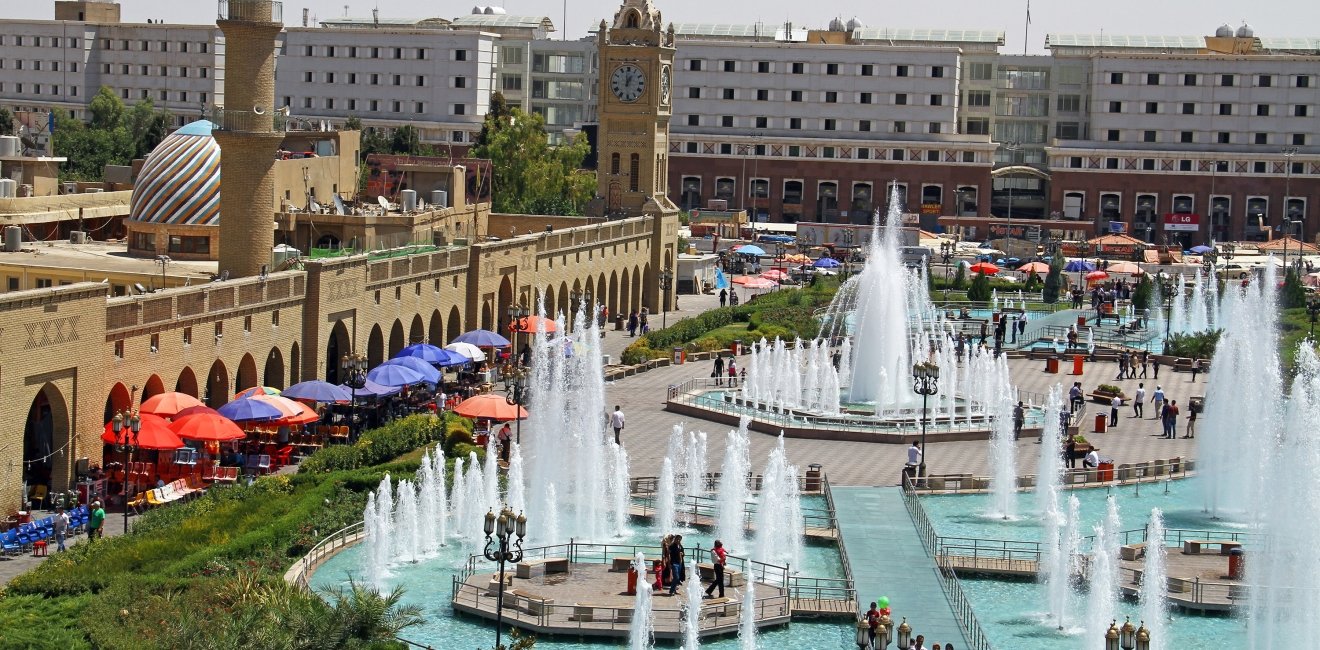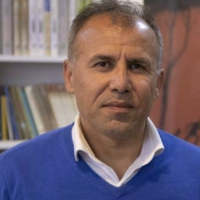Iraq and China are deepening their cooperation after the two sides elevated their relationship to a strategic partnership in 2015. The Chinese government and businesses have taken advantage of the country's poor security, governance, and investment climate in the south and east to expand their presence, particularly in the energy sector. Iraq is now a major recipient of Chinese Belt and Road Initiative (BRI) construction contracts – a relatively new development. In 2019, Iraq and China signed a 20-year oil-for-construction agreement. Former Iraqi Prime Minister Adel Abdul Mahdi, flirting with old Maoist jargon, described the agreement as a "quantum leap" in Sino-Iraqi relations.
Iraq's relationship with China is always expressed positively in semi-mythical terms, and officials in their meetings trace the relationship back to the ancient Silk Road that was said to connect the two sides; the new Silk Road, or BRI, is reuniting them.
Chinese support for 'revolutionary Iraq' had a significant impact on the new Iraqi elites, particularly the leftist factions, and established the foundation for Iraqi and Kurdish Maoism.
However, the real encounter between the two countries began after Iraq's coup in 1958. In the summer of that year, General Abdul Karim Qasim deposed the Iraqi monarchy and on July 16, 1958, China took advantage of the opportunity to recognize the new government. Chinese support for "revolutionary Iraq" had a significant impact on the new Iraqi elites, particularly the leftist factions, and established the foundation for Iraqi and Kurdish Maoism.
Despite these circumstances, China's relations with Iraq were limited until the last two decades. Many factors pushed the two sides closer together, including Iraq's need for liquidity, reconstruction following the conflict with ISIS, the impact of low oil prices, and ‘rightsizing’ of US forces in Iraq. A major contributor was also the global shift in oil consumption toward the east.
Oil for reconstruction
China is now one of Iraq's most important trade, energy, and construction partners. The 2019 'oil for reconstruction' deal signed during Prime Minister Adel Abdul Mahdi's reign reflects, among other things, the perception among many developing countries that the Chinese experience is a more appealing model for their own development than others. During my meetings with Iraqi elites, they expressed admiration for China's major constructions and vast development accomplishments.
According to the former Iraqi minister of transport Amer Ismail, it was the late Iraqi politician Ahmed Chalabi who suggested the idea of oil for construction with China. According to him, a large part of Iraq’s revenue goes to recurrent expenditures, including salaries, leaving Iraq bereft of revenue for major infrastructure projects. In order to overcome this shortage, Iraq has to seek an outside flow of money, and China was seen as a possible source through its BRI projects.
This is where the new meaning of ‘the oil for reconstruction deal’ emerged. Iraq has oil and requires construction; China needs oil and can build.
The Chinese experience, unlike the western model, also provides a psychological feeling of ease and confidence to the Iraqi elites. Until recently, China was a very poor country; in 1978, 90 percent of China’s population was living in extreme poverty, by 2014 that number had been reduced to less than one percent. China’s “developmentalists” emphasize infrastructure, construction, and other material aspects of governance while downplaying the importance of democratic rights and freedom. This is where the new meaning of ‘the oil for reconstruction deal’ emerged. Iraq has oil and requires construction; China needs oil and can build.
Advocates of this approach have attempted to rally public support. According to the Iraqi Oil Report, the Silk Road grassroots movement campaign has laid the political groundwork for Iraq to embrace China's Belt and Road Initiative. To mobilize the grassroots, organizers portray the US as an invader, bombing the country and refusing to let it rebuild, while they portray China as a model for rapid and massive development and change. This school of thought is closely associated with pro-Iranian organizations.
However, despite this rhetoric and propaganda, there is a large segment of society that is either dissatisfied with the current government or shares interests with the ad hoc local organizers who are directly or indirectly linked to the main Shia political parties. The tactics used thus far have only appealed to a small portion of the population, as the majority has lost faith in any promise of generating widespread wealth.
The elite and China
Seeing China as a balancer against the US in Iraq and the region is another trend among some members of the Iraqi elites, who view international relations as a form of alliance-building after growing up under US and western alliance politics. Within this context, they see China as a potential ally, despite the fact that China does not engage in alliance politics. Rather they quietly promote the notion of replacing the US in Iraq. According to this view, China is a supporter of pro-Iranian and anti-US groups in Iraq, and while Iran's turn to the east supports this, the main reason, as Harith Hassan argues, is to maintain the status quo. While China is indirectly encouraging this approach, it is not openly welcoming it. One characteristic of Chinese diplomacy in the region is keeping a strategic distance from all local groups.
Former Iraqi Prime Minister Adel Abdul Mahdi articulates this viewpoint rather sophisticatedly. As a former Maoist intellectual in the 1960s, he advocated the merger of the new world and disintegration of the old one. Abdul Mahdi sees China as the champion of "developing-world people." According to this school of thought, the West does not allow developing countries to prosper and, “legitimized pillage and conquest with a system of uneven accumulation of wealth, unequal exchanges, and monopolies,” he claims. Because he considers hegemony to be exclusively Western, it is clear that his approach is reactionary and ideological.
Hadi al-Alawi, an Iraqi Sinophile, first established this worldview. In 1976, he fled to China and began working for the Xinhua news agency and teaching Arabic. According to him, “In order for Arabs to complete the two-century project of national liberation, they must reclaim the masha'I (communalism) of Eastern tradition.
The Kurds have a variety of perspectives on China. Former Iraqi president and Patriotic Union of Kurdistan leader Jalal Talabani, for example, saw Mao and Maoism as political role models. This was shaped by global Maoism in the 1960s, during the Kurdish civil war. According to Talabani, China is more similar to Iraqi Kurdistan in terms of socioeconomic structures, so Maoism is more compatible with the Kurdish situation in Iraq. This rather idealistic view aided in the establishment of close relations between the Patriotic Union of Kurdistan (PUK) and China, which led to the latter's relations with the Kurds in Iraq.
However, unlike the other permanent members of the UNSC, China has yet to grant the Kurdistan Regional Government permission to open an office in Beijing.
The other Kurdish point of view on China is less ideological and stems from the Kurds' desperate need for international assistance and protection. Political elites in Erbil believe that the presence of the Chinese general consulate in the regional capital will grant them access to one of the permanent UN Security Council (UNSC) members, especially useful during crises and UNSC voting. However, unlike the other permanent members of the UNSC, China has yet to grant the Kurdistan Regional Government permission to open an office in Beijing.
Unlike the Shia and Kurds, the Sunni community has not articulated its position on China. There could be a number of reasons for this, including their new role controlling the legislative branch, which China generally disdain in order to avoid transparency and accountability, the ISIS conflict, and security issues. China has only recently begun to invest in the Sunni region, as evidenced by the Mansuriya gas field, which is set to begin commercial production in 2026. It remains to be seen whether the latter's stance toward China will evolve as a result of increased investments and presence in the area.
The Sino-Iraqi relationship in the regional context
It is clear that Iraqi elites and society possess differing perspectives on China. Most of these views have their origins in local and regional contexts. These differences, among other things, demonstrate the complexity and multipolarity of Iraqi society, and thus their worldview. It also demonstrates the limits to labeling China as a new power on the global stage with its own quirks.
If, as the new Republican Speaker of the House Kevin McCarthy put it, we are entering an era of distrust between China and US, then this new atmosphere will have an impact on other regions. Increase in great power competition trickle down to the regional and local levels, as happened during the Cold War, when Gaddis described that the tail was often wagging the dog.
Iraq and Iraqi Kurdistan are unique in this regard. The country is one of the few in the world where both the US and China are actively involved. My interactions with both sides indicate that they are keeping an eye on each other's interests, particularly telecommunications and data collection. Iraq has a bad track record when it comes to balancing the interests of great powers, as the post-1958 coup demonstrated.
While the country wishes to accommodate both the US and China, and may require both to maintain security and begin real development, the fanaticizing of its elites' , that critics describe as limited, binary, and illusionary, suggest that it may be incapable of managing such a complex relationship.
The views expressed in these articles are those of the author and do not reflect an official position of the Wilson Center.







